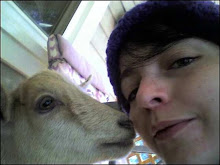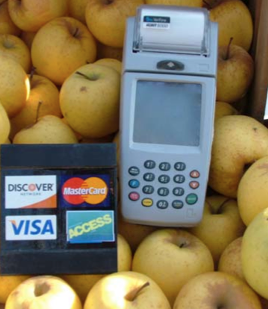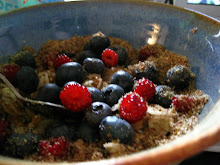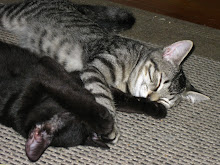My brother and I looked at each other, our mouths full of hurt chickens, and had simultaneous how-in-the-world-could-I-have-never-thought-of-that-before-and-why-on-earth-didn’t-someone-tell-me? moments. I put down my fork. Frank finished the meal and is probably eating a chicken as I type these words.
What our baby sitter said made sense to me, not only because it seemed so self-evidently true, but also because it was the extension to food of everything my parents had taught me. We don’t hurt family members. We don’t hurt friends or strangers. We don’t even hurt upholstered furniture. My not having thought to include farmed animals in that list didn’t make them the exceptions to it. It just made me a child, ignorant of the world’s workings. Until I wasn’t. At which point I had to change my life.
You know Jonathan Safran Foer, right? Of Everything Is Illuminated fame?

One of the reasons I love that passage so much is that that is exactly the reason my sweetheart gave me when I asked him why he was vegan. He didn't want cruelty to be part of his life. (I was instantly smitten... and nearly instantly vegan.)
Foer tells how he oscillated between not eating meat and eating meat during most of his growing-up years from that time on. He goes through many familiar stories, including going veg in high school to meet activist girls, eating meat in college to resist the vegetarian culture on campus, going veg again upon taking a philosophy course and doing some self-described "pretentious" thinking about reason, eating meat again upon graduating and telling himself it was because he was only human, going veg again upon getting married out of a grand idea of improving himself and his new life with his bride... and then, well, oscillating again:
Of course our wedding wasn’t vegetarian, because we persuaded ourselves that it was only fair to offer animal protein to our guests, some of whom traveled from great distances to share our joy. (Find that logic hard to follow?) And we ate fish on our honeymoon, but we were in Japan, and when in Japan. . . . And back in our new home, we did occasionally eat burgers and chicken soup and smoked salmon and tuna steaks. But only whenever we felt like it.
And then going veg again when his first son was born:
Feeding my children is not like feeding myself: it matters more. It matters because food matters (their physical health matters, the pleasure they take in eating matters), and because the stories that are served with food matter.
Foer is not vegan. I guess the desire not to hurt anything doesn't always extend to chickens, and it doesn't extend to baby cows and their mothers. Wait, that's not right. The desire not to hurt anything, I'm sure, extends to everything. The reason doesn't follow through for him, though. The practice doesn't follow. His actions are not in line with his thoughts, knowledge, and ideals.
Maybe someday he'll get there. And retreat, and get there again, and retreat, and hopefully get there again.
Even while contributing to factory farming, Foer can help raise awareness of it in people who might not otherwise pay attention but who like Foer as a writer. He points out in the article the fallacy many meat-eaters use as a defense. Which is: I know factory farming is bad, but that doesn't mean I have to cut out all meat. In their minds, there are little farms that probably maybe just might have produced the meat they ordered last night at a restaurant. It's just not so, though:
According to an analysis of U.S.D.A. data by the advocacy group Farm Forward, factory farms now produce more than 99 percent of the animals eaten in this country. And despite labels that suggest otherwise, genuine alternatives — which do exist, and make many of the ethical questions about meat moot — are very difficult for even an educated eater to find. I don’t have the ability to do so with regularity and confidence. (“Free range,” “cage free,” “natural” and “organic” are nearly meaningless when it comes to animal welfare.)According to reports by the Food and Agriculture Organization of the U.N. and others, factory farming has made animal agriculture the No. 1 contributor to global warming (it is significantly more destructive than transportation alone), and one of the Top 2 or 3 causes of all of the most serious environmental problems, both global and local: air and water pollution, deforestation, loss of biodiversity. . . . Eating factory-farmed animals — which is to say virtually every piece of meat sold in supermarkets and prepared in restaurants — is almost certainly the single worst thing that humans do to the environment.
Safran still needs to do the research on animal testing:
This isn’t animal experimentation, where you can imagine some proportionate good at the other end of the suffering.What? Wow.
But what he lacks in consistency (by his own admission), he makes up for with skill in drawing comparisons that make sense and illustrating them in a way that matters:
This is what we feel like eating. Yet taste, the crudest of our senses, has been exempted from the ethical rules that govern our other senses. Why? Why doesn’t a horny person have as strong a claim to raping an animal as a hungry one does to confining, killing and eating it? It’s easy to dismiss that question but hard to respond to it. Try to imagine any end other than taste for which it would be justifiable to do what we do to farmed animals.
Foer doesn't mention dairy, the lives of cows, eggs, or the lives of chickens in this excerpt from his book, but he does describe himself and his family as vegetarians, and I assume that doesn't mean vegan.
I am looking forward immensely to the new book, Eating Animals, and I plan to stop resisting all the people who have told me to read Everything Is Illuminated. I shall read it. Hopefully, one day, for Foer, everything finally will be.




























No comments:
Post a Comment